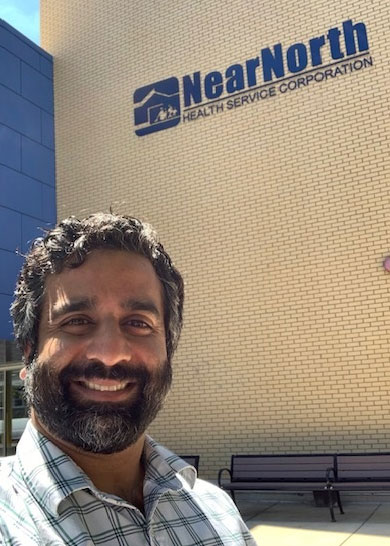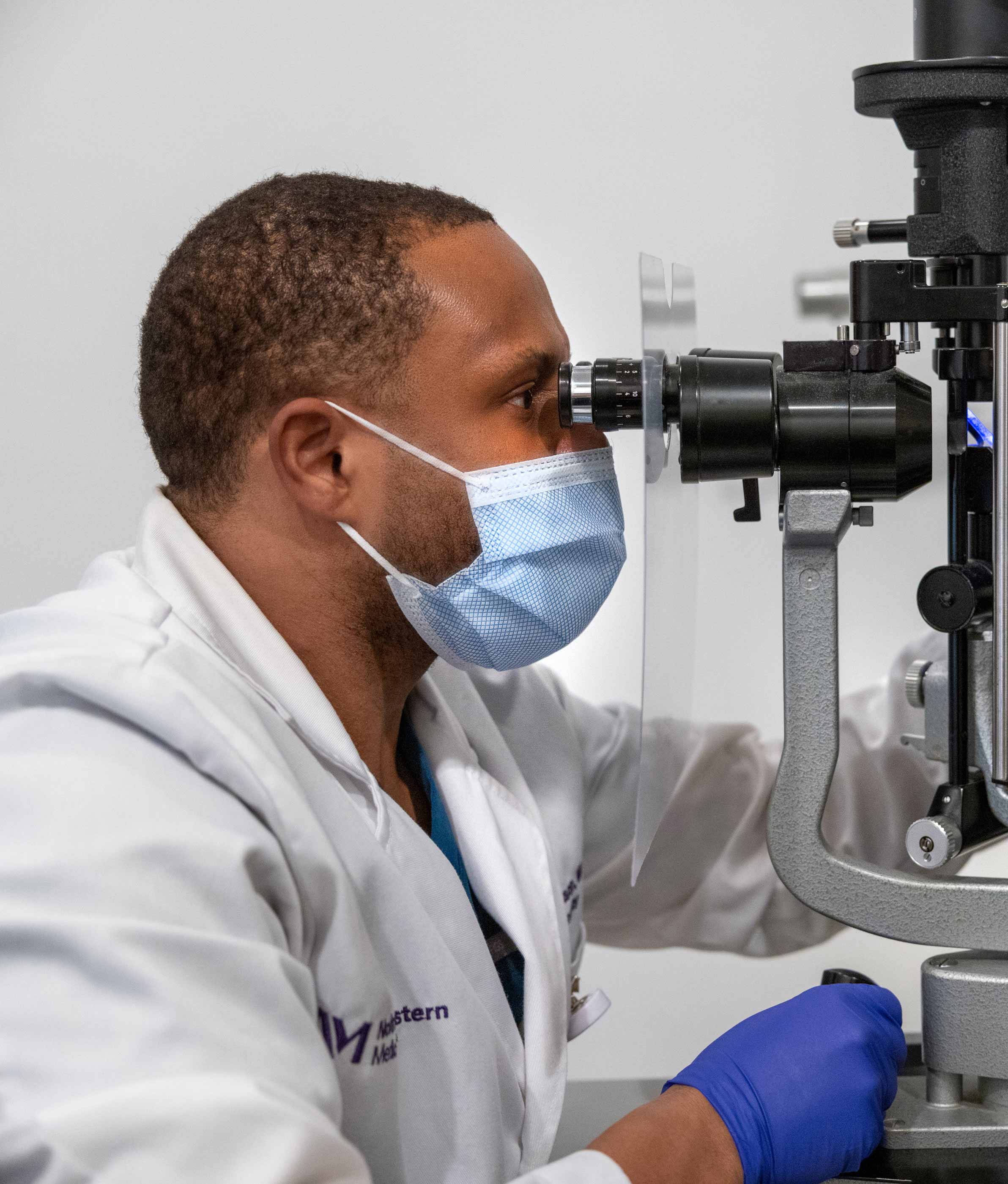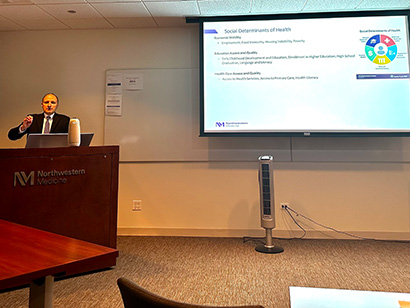Diversity, Equity & Inclusion
In the Department of Ophthalmology, it is our mission to:
- Celebrate and prioritize diversity such that we create a culture where trainees and faculty are encouraged to bring their unique and diverse perspectives.
- Provide exceptional training on how to address and deliver equitable and culturally responsive eye care to all patients, regardless of age, race/ethnicity, gender, sexual orientation, religious beliefs or physical abilities.
- Reflect on the structures that have played a role in the underrepresentation of minority groups in ophthalmology and use this knowledge to cultivate an inclusive community for our patients, trainees and faculty.
We recognize that there is always more work to be done to promote diversity, equity and inclusivity. We are committed to working with our faculty, trainees and patients to improve health disparities in our field.
Read a Message from Our Chair
Despite some efforts and attention over the past several years, there continues to be a dramatic underrepresentation of both ethic and racial minorities in medicine and, in particular, in ophthalmology. In addition, social determinants of health have led to a public health crisis. Fortunately, the past three years has been a time of growth for me and our department, the medical school and the Northwestern Medicine healthcare system. There is an institution-wide call to action to address the unfair treatment of and healthcare delivery disparities present and plaguing the lives of our Black and brown citizens. There is also an institution-wide commitment to ensure the diversity of our students, residents and faculty to be sure they reflect the diversity of our entire population. Our country is in a state of social upheaval. We were all stunned by the horrific death of George Floyd, a great and unthinkable injustice. This occurred at the same time we were acknowledging the unfair burden of illness and death borne by our Black and brown community during the COVID-19 pandemic. Racism and its systemic structural, institutional and intra-personal forms is a public health emergency. The social circumstances and disparities that put people in harm’s way and lead to premature illness and death are critical issues in our society, one that assigns value and opportunity to some at the same time disadvantaging others. We all know it, we are all aware of it but seemingly have not gotten to the point where we’re doing enough about it.
We must continue to grow as a diverse community that will make every effort to reduce racism and to ensure an inclusive diverse and equitable culture. From a healthcare standpoint, we have launched several initiatives to be certain that we do our part to eliminate the social determinants of health as a barrier to providing necessary eye care. It is well-established that racial and ethnic minorities are at higher risk for losing vision and that socioeconomic status often causes individuals to underutilize healthcare. Several initiatives are in place to ensure that our best efforts are put forward to screen and treat eye disease in all of Chicago's communities. We must assist this vulnerable portion of our population by providing the necessary resources to maintain and improve health whenever possible. We are committed to actively doing what we can to eliminate racism and ensure that all care is equal and equitably provided, to eliminate bias and to ensure a diverse training program and faculty.
Our medical school and our healthcare system are actively engaging in the community, and we all must grow to an increased sense of urgency around pervasive racism and its manifestations, which limit our patients, our trainees, our faculty and our citizens of Chicago. I and this department are fully committed to this journey. I hope we can all commit to addressing the bias and, most importantly, the health inequities that exist in our city. We must be certain that we ensure the best possible care for all of our patients and treat each other treat in the most fair and unbiased fashion. We have made some strides to greater diversity, equality and inclusion, but many challenges remain moving forward. We must embrace change and reduce our level of complacency. We must all do what we can to improve on the environmental factors that inform the social determinants of health to ensure that all of our patients are cared for in an optimal fashion. We will move forward in the most deliberate way to embrace our diversity and be certain that everyone has the same chance to succeed and be healthy. As outlined below we have made strong commitments to caring for our entire Chicago community as well numerous pipeline programs to ensure that previously underrepresented physicians in ophthalmology become our future residents and our faculty. We must make science and medicine as a career, available, accessible and attainable for all. I am excited to lead and champion this effort.
Nicholas Volpe, MD
Chair of the Department of Ophthalmology
Recruitment
The Northwestern Ophthalmology Residency Program is committed to recruiting a diverse workforce. We believe that the providers treating our patients should reflect the diversity seen in the patient population that we care for. For many years, we have adopted a holistic review process with standardized interviewing practices and a diverse representation amongst our selection committee.
Community Engagement
Our faculty members serve in community clinics such as those part within the Kostner Clinic and Near North Health, through which our senior residents rotate at Winfield Moody Health Center.
In addition, for more than 15 years, we have provided free ophthalmology services with CommunityHealth, the largest volunteer-based health center in the nation. The clinic is a collaborative effort between medical students, trainees and faculty to provide high quality and culturally competent transitional care for Chicago’s underserved patient population.
Working in community clinics is an opportunity for trainees to learn about the unique challenges that the community faces as well as empower them to address healthcare inequities while leveraging local and state programs to enhance our healthcare delivery.
-
 "I feel privileged to work at the Near North Healthservice Corporation. As a federally qualified healthcare center, many of the patients I see are uninsured or underinsured, or otherwise have limited access to the healthcare system. Near North provides primary and certain specialty care for all patients. As an ophthalmologist, being able to help detect eye disease, especially in patients who may not otherwise see an eye doctor, can have big impacts on patients' quality of life. I also enjoy being an advocate for my patients, to help guide people who need intervention or further evaluation, but may not have insurance, through the difficult process of accessing the necessary care. Near North provides an important service for a large part of our community, and I am lucky to be a part of it!" - Dr. Anjum Koreishi
"I feel privileged to work at the Near North Healthservice Corporation. As a federally qualified healthcare center, many of the patients I see are uninsured or underinsured, or otherwise have limited access to the healthcare system. Near North provides primary and certain specialty care for all patients. As an ophthalmologist, being able to help detect eye disease, especially in patients who may not otherwise see an eye doctor, can have big impacts on patients' quality of life. I also enjoy being an advocate for my patients, to help guide people who need intervention or further evaluation, but may not have insurance, through the difficult process of accessing the necessary care. Near North provides an important service for a large part of our community, and I am lucky to be a part of it!" - Dr. Anjum Koreishi
-
 "The goals of my involvement in the Homan Komed Ophthalmology Clinic are to serve the community that I reside and to serve the south side of Chicago in which I was raised. I want to create access to quality eye care to those that may feel that they are undeserving of such care at times. I would like to educate the south side community near Komed Clinic to seek quality health care and know they have the ability to access outstanding ophthalmologic care". - Dr. Stephen Watson
"The goals of my involvement in the Homan Komed Ophthalmology Clinic are to serve the community that I reside and to serve the south side of Chicago in which I was raised. I want to create access to quality eye care to those that may feel that they are undeserving of such care at times. I would like to educate the south side community near Komed Clinic to seek quality health care and know they have the ability to access outstanding ophthalmologic care". - Dr. Stephen Watson - "CommunityHealth (CHC) (https://communityhealth.org) is the largest volunteer-based health center in the nation and Feinberg as well as many of the other Chicagoland medical schools contribute volunteers to provide needed care to the underserved population of Chicago. It is simply a great institution, and its number one goal is to provide Care (with a capital C)! Ultimately, for future doctors, this is an exposure to things they may have never experienced before. The students learn so much not just about Ophthalmology, but I believe about Diversity, Equity and Inclusion. We learn that appreciating Diversity helps us be better and more empathetic caregivers. Appreciating the struggle for Equity makes us humbler. Understanding that these patients are sharing their lives and we are partners in health makes us understand how Inclusion is for our own improvement. We gain so much more than we give by participating in CHC". - Dr. Hawke Yoon
Education & Events
See some of our past educational events related to diversity, equity and inclusion to get a sense of our regular diversity programming. We also annually participate in Health Equity Week with McGaw Medical Center of Northwestern University.
Past Events
- 2/26/24 - 3/1/24: 4th Annual Health Equity Week
- 5/12/23: Department of Ophthalmology, Healthcare Disparities Grand Rounds. "Healthcare Disparities in Eye Care" Paul Bryar, MD; "NM Outreach & SDOH Follow Up" Jennifer Calabria, MD; "NU Healthcare Disparities Research" Dustin D. French, PhD.

- 2/17/23: Department of Ophthalmology, Healthcare Disparities Grand Rounds. "Healthcare Disparities in Eye Care" Drs. Paul Bryar & Hawke Yoon
- 10/21/22: Department of Ophthalmology, Program in Lasting Leadership and Academic Representation (PILLAR). Haroon Ismail, MD & Maryam Ige, MD
- 5/6/22: Department of Ophthalmology, Diversity Grand Rounds. "Bias in learner evaluations, assessment, and recommendations." Oluwateniola Brown, MD, Assistant Professor of Obstetrics & Gynecology, Assistant Director of Diversity and Inclusion for McGaw Medical Center
- 8/23/21: Rabb-Venable Pathway to Success Fireside Chat
- 4/23/21: Department of Ophthalmology, Equity Workshop for Residents & Fellows. Oluwateniola Brown, MD, Assistant Professor of Obstetrics & Gynecology, Assistant Director of Diversity and Inclusion for McGaw Medical Center
- 12/18/21: Department of Ophthalmology, Diversity Grand Rounds. “Disparities in Healthcare." Sadiya Khan, MD, Assistant Professor of Medicine (Cardiology) and Preventive Medicine (Epidemiology)
- 5/22/20: Department of Ophthalmology, Diversity Grand Rounds. “Diversity, Equity and Inclusion: What has 2020 taught us?” Linda Suleiman, MD, Assistant Professor of Orthopaedic Surgery, Assistant Dean of Medical Education, Director of McGaw Diversity & Inclusion
Health Disparities Research
Our trainees and faculty are actively involved in health disparities research. These endeavors help us to gain a better understanding of health inequities and provide the knowledge needed to combat these barriers. Read a selection of our publications below.
Articles
- "Payment Reform Needed to Address Health Disparities of Undiagnosed Diabetic Retinopathy in the City of Chicago"
- "Reliability of Online Patient Education Materials for Glaucoma"
- "Nonmydriatic Retinal Diabetic Screening in the Primary Care Setting: Assessing Degree of Retinopathy and Incidence of Nondiabetic Ocular Diagnoses"
- "Payment Reform Needed to Address Health Disparities of Undiagnosed Diabetic Retinopathy in the City of Chicago"
What We're Reading
Articles
Federal Grant Funding
-
“Understanding Diabetic Eye Disease in the Underserved Using Health Data Exchange.” National Eye Institute Grant Number 1R21EY024050-01A1, French, Dustin Douglas (Primary Investigator) Bryar, Paul (Co-Investigator), Evans, Charlesnika T (Co-Investigator), Kho, Abel N (Co-Investigator), Walunas, Theresa L. (Co-Investigator). National Institutes of Health
Books
- Bad Blood: The Tuskegee Syphilis Experiment, New and Expanded Edition
- The Health Gap: The Challenge of an Unequal World
- Waking up Blind: Lawsuits Over Eye Surgery